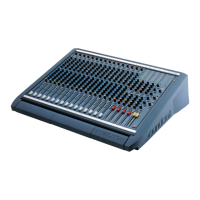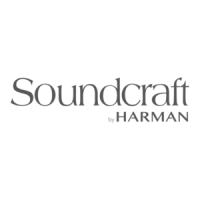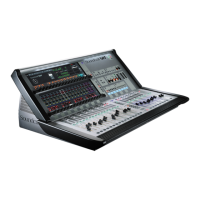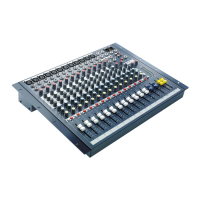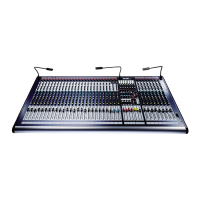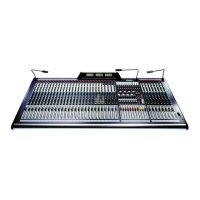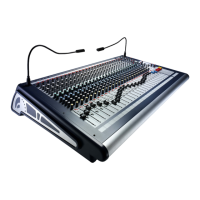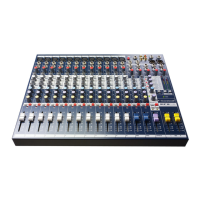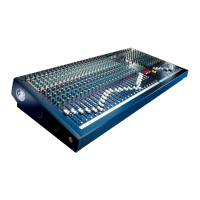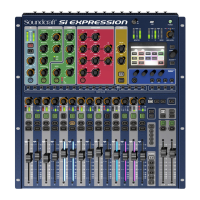Do you have a question about the SoundCraft DC 2020 and is the answer not in the manual?
Details the features and capabilities of the DC2020 in-line studio mixing console.
Details the physical dimensions and weight specifications for different DC2020 configurations.
Step-by-step instructions for assembling the console stand for the DC2020.
Guidelines for proper wiring and earthing to ensure optimal performance and safety.
Information and warnings related to the APS520 power supply unit for the DC2020.
Provides pinout details for DIN connectors used on the DC2020 console.
Details the pinout configurations for D-Type connectors on the DC2020.
Explains the use and connection of the BNC connector for video sync input.
Provides installation steps for the DC2020 emulation software on Macintosh and Windows.
Lists EDAC pin assignments for tape tracks 1 through 8 on the patchbay.
Lists EDAC pin assignments for tape tracks 9 through 16 on the patchbay.
Lists EDAC pin assignments for tape tracks 17 through 24 on the patchbay.
Lists EDAC pin assignments for tape tracks 25 through 32 on the patchbay.
Lists EDAC pin assignments for tape tracks 33 through 40 on the patchbay.
Lists EDAC pin assignments for Aux and Foldback outputs, stereo inputs, and studio phones.
Lists EDAC pin assignments for control room/mix outputs and 2-track inputs/speakers.
Details EDAC pin assignments for line inputs 1 through 24 on the patchbay.
Lists EDAC pin assignments for tie lines 1 through 24 on the patchbay.
Lists EDAC pin assignments for tie lines 25 through 48 on the patchbay.
Lists EDAC pin assignments for tie lines 49 through 72 on the patchbay.
Lists EDAC pin assignments for tie lines 73 through 96 on the patchbay.
Lists EDAC pin assignments for tie lines 97 through 120 on the patchbay.
Diagram illustrating the signal path and components of a mono input channel.
Diagrams showing the signal flow for stereo inputs and group processing.
Illustrates the block diagram for the auxiliary master signal paths.
Diagrams for studio outputs, foldback masters, and oscillator/talkback functions.
Illustrates the signal flow for the mix and control room monitoring sections.
Detailed description of the controls and functions of the mono input channels.
Explains the controls for gain, phase, high-pass filter, and input selection on mono channels.
Describes the tape return switching and trim control for mono inputs.
Details the HF/LF EQ and Hi Mid/Lo Mid EQ sections, including controls and switching.
Explains the operation of Aux1, Aux2, Aux3, and Aux4 level and cut controls.
Describes the Foldback 1 and Foldback 2 level controls and their signal routing.
Explains the Channel and Monitor pan controls and their stereo image positioning.
Details how signals are routed from channels to groups using the routing matrix.
Describes the channel fader, peak detection, and solo functions within the channel path.
Explains the monitor fader, peak detection, solo, cut, and selection switches.
Describes the Manual, Read, Armed, and Write modes for automated faders and switches.
Explains the Solo and Solo-In-Place modes, including SIP safe functionality.
Details how meters are used to monitor channels and groups, and meterbridge setup.
Describes the controls and functions for group and stereo input channels.
Explains the input level switching, stereo EQ, and fader/balance controls for stereo inputs.
Details the 2-band shelving EQ for stereo inputs, including frequency and boost/cut controls.
Explains how stereo input signals are routed to foldback and mix buses.
Describes the functions of the 8 group buses, including routing to tape sends and track bouncing.
Explains the metering options for stereo inputs and groups, including switching and LEDs.
Describes the controls and functions of the four auxiliary buses and their master levels.
Explains the level, AFL, and cut controls for Auxiliary 1, including automation integration.
Explains the level, AFL, and cut controls for Auxiliary 2, including automation integration.
Explains the level, AFL, cut controls, and the Aux3 to Aux1 path switching.
Explains the level, AFL, and cut controls for Auxiliary 4, including the Aux4 to Aux2 path.
Describes the functions of studio outputs and the two foldback master channels (FB1, FB2).
Explains the controls for studio speaker and headphone output levels and source selection.
Details how signals from input and stereo modules are fed to the foldback master channels.
Explains how stereo input signals are routed to the foldback master channels.
Describes the controls and functions of the oscillator and talkback system.
Explains the sine wave oscillator, its frequency selection, level control, and calibration.
Details the talkback system, including the built-in mic, gain control, and routing options.
Explains the setup and operation of the four control groups for managing multiple channels.
Describes how solo, uncut, and cut functions are applied to channels within a control group.
Describes how solo, uncut, and cut functions are applied to monitors within a control group.
Explains how to change modes (Manual, Read, Armed, Write) for switches and faders assigned to control groups.
Details the controls on the stereo master panel, including solo system and global mode changes.
Explains the Solo, SIP, and SOLO/AFL modes, and how to reset the solo system.
Describes how to change the modes of automated functions globally using mode switches.
Explains how to select and control modes for switches on various master panels via the SEL switch.
Describes the system for controlling and monitoring audio in the control room via phones and speakers.
Explains the Solo Trim control and how to select the control room audio source.
Details the 2TA, 2TB, MIX, and MONO switches for control room source selection.
Provides an introduction to the DC2020's patchbay for flexible signal routing.
Diagram showing the physical layout of the patchbay fascia with all connection points.
Illustrates the wiring conventions for Bantam-type sockets and EDAC connections on the patchbay.
Wiring details for line inputs 25 through 40, noting differences from earlier inputs.
Wiring diagram for group insert send and return connections on the patchbay.
Wiring diagram for group output connections on the patchbay.
Wiring diagram illustrating SMPTE timecode input and output connections on the patchbay.
Wiring diagram for stereo input connections on the patchbay.
Wiring diagram for auxiliary output connections on the patchbay.
Wiring diagram for foldback output connections on the patchbay.
Wiring diagram for studio headphone output connections on the patchbay.
Wiring diagram for studio speaker output connections on the patchbay.
Wiring diagrams for mix insert and 2-track send connections on the patchbay.
Wiring diagram for 2-track return connections on the patchbay.
Wiring diagram for control-room and alternative speaker output connections.
Wiring diagram illustrating the parallel socket connections on the patchbay.
Wiring diagram showing tie line input connections on the patchbay.
Comprehensive guide to understanding and using the DC2020's automation system.
An introduction to the automation system, covering the control panel and screen layout.
Description of the physical layout and components of the automation control panel.
Explains the touch-sensitive LCD screen, its layout, and navigation elements.
Details the functions of the keyboard buttons and the jog wheel for automation control.
Explains manual tape machine transport controls like REW, FF, PLAY, STOP, RECORD, and LOCATE.
Details the DROP IN, DROP OUT, RECORD ENABLE, and PREVIEW functions for track recording.
Explains the various functions of the jog wheel, including search, scrolling, and editing.
Describes how to activate automated mixing, save mixes, and abort changes.
Explains the Glideback function for fader automation and storing/recalling snapshots.
Information about the floppy disk drive and internal hard disk drive used by the system.
Introduction to the project management system for storing and retrieving mix data.
Explains the hierarchical structure of the directory system for organizing projects, titles, and mixes.
Details the Studio page, user creation, selection, and studio configuration options.
Describes the User page, project creation, selection, and user configuration/utilities.
Details the Project page, title creation, selection, and access to mix pages.
Explains the Mix page, cue lists, mix passes, and access to other automation functions.
Overview of pages within the automation system and their organization.
Illustrates the interconnection map of the main automation system's pages.
Explains how to access and navigate the setup system pages for console configuration.
Describes the alphanumeric keypad used for text input and editing within the automation system.
Explains how to view, add, delete, and edit channel entries in the channel list.
Allows setting and clearing the SIP safe status for individual channels.
Defines the modes (Armed, Write, Manual, Read) for faders and switches when the tape machine stops.
Allows setting default frame rate and fine-tuning fader motion for new titles.
Explains how to edit MIDI events, including event type, timecode, and names.
Allows adjustment of glide rate (dB per frame) and copying settings to other faders.
Explains how to assign input channels to control groups for simultaneous fader/switch control.
Details how to switch meters between tape sends/returns, Mix/CRM, and Stereo/Groups.
Describes the Midi Events page for viewing, editing, and managing MIDI events.
Explains the Mix page for creating, editing, and managing mix passes and cue points.
Details the concept of cue points and how to insert and edit them for mixes.
Explains the fields for storing mix information such as tape speed, noise reduction, and artist.
Describes how to view, select, edit, protect, and delete saved mix passes from the mix list.
Allows setting and clearing the SIP safe status for individual monitors.
Configures options for on-line mixing, including edit mode and tape shuttle wheel usage.
Explains how presets store automated function states and can be recalled for configurations.
Shows how to recall stored presets and manage them via playback modes and utilities.
Accesses utilities for creating new mixes from timed presets and sorting presets by timecode.
Allows overwriting existing presets with current desk settings, with a confirmation prompt.
Enables the creation of new presets, assigning current desk settings and timecode values.
Allows users to assign new labels to presets using an on-screen QWERTY keyboard.
Enables editing the timecode value associated with a preset using a numeric keypad or jog wheel.
Allows deletion of the current preset, with a confirmation prompt due to potential danger.
Enables inserting a new preset above the currently selected preset in the list.
Renumber presets so their numbering comprises only a single integer part.
Describes the Project page for managing titles within a project, including protection and editing.
Allows setting project memos and viewing elapsed project time.
Provides utilities for backing up, restoring, duplicating, changing mix disk, formatting, and shutting down.
Allows enabling and disabling the record status of individual channels and viewing REC LED status.
Enables using any tape track with any input channel and retaining track control during drop-in/out.
Allows swapping stored mix movements between input channels for flexibility.
Explains how to access the setup menu for console configuration via touch-pads.
Allows setting and clearing the SIP safe status for stereo inputs A, B, C, and D.
Configures options for writing faders/switches to end of mix or updating faders on stop.
Details the Studio page, user management, protection, and editing functions.
Allows configuration of studio name, tape machine, date, time, and port settings.
Provides utilities for backing up, restoring, duplicating, changing mix disk, formatting, and shutting down the console.
Defines which switches are selected when the tape machine stops.
Allows pre-selection and selection of three tape machines for remote control.
Details the setup for generating timecode for tape striping, including frame rates and start/run/stop.
Allows configuration of locate pre-roll/post-roll, drop-in/out times, and mix save options.
Explains the process of dropping in/out sections of tracks using cue points and record enable.
Provides utilities for backing up, restoring, duplicating, changing mix disk, formatting, and shutting down titles.
Explains how to view, add, delete, and edit track entries in the track list.
Details the User page for managing projects, including protection and editing.
Allows setting recall console, backup depth, password, and mix sound beep options.
Provides utilities for backing up, restoring, duplicating, changing mix disk, formatting, and shutting down users.
Guide to using the automated mixing features of the DC2020 console.
Instructions for switching on the console and loading the automation program from disk or RAM.
Explains how to initiate automated mixing by pressing MIX ON and choosing to start a new mix or edit an existing one.
Details how cue points are stored, inserted, edited, and used to facilitate mixing.
Explains the four modes (Manual, Read, Armed, Write) for automated faders and switches, and how to change them.
Describes how faders behave in armed mode and how to edit their positions during mixing.
Explains how to edit switch transitions (On/Off) and the implications of armed and write modes.
Explains how to assign monitors to control groups and manage fader/switch modes via groups.
Compares fader and switch data storage and explains fader disengage for travel limitations.
Describes tools for moving the tape, including remote controls, jog wheel, and cue points.
Guides through the first run-through for mixing a new title, setting fader positions, and aborting mixes.
Explains how to edit existing mixes, including assigning cue markers and managing mix names.
Describes how to abandon current mixes and start a new mix pass, setting faders and switches to write mode.
Provides detailed technical specifications for the DC2020 mixing console.
Details the frequency response characteristics of the DC2020 console.
Specifies the total harmonic distortion levels for various signal paths.
Details the noise specifications, including EIN and various noise floor levels.
Specifies the CMRR for mic and line inputs, indicating noise rejection capabilities.
Details crosstalk measurements between channels, faders, and routing paths.
Lists the input and output impedance values for various connections on the console.
Details maximum input and output levels for various connections.
Specifies sensitivity levels for mic, line, insert, tape, and mix outputs, plus video sync.
Notes on machine control for software release 7.05, detailing supported protocols and tape machines.
Lists supported tape machines and protocols, including MIDI, Fostex, Alesis, and Sony 9-pin.
Explains timecode display, SMPTE reader flywheel, and control button support from tape machines.
Details using the DC2020 as a MIDI timecode master, including transport controls and setup notes.
Explains using the DC2020 as a MIDI timecode slave, with transport controls and setup notes.
Details using the DC2020 with MIDI Machine Control (MMC) and MIDI Timecode (MTC).
Explains using MMC protocol with SMPTE Longitudinal Timecode (LTC) for machine control.
Describes the DC2020 as a slave to incoming SMPTE Timecode, with transport controls and setup notes.
Details additional hardware, transport controls, and setup notes for AKAI DR4 integration.
Details hardware, transport controls, setup notes, and other notes for Alesis ADAT (AI-2) integration.
Details transport controls, locate, record enable, and setup notes for Alesis BRC (MTC) integration.
Details hardware, transport controls, setup notes, and connection diagrams for Fostex G series (MIDI).
Details hardware, transport controls, setup notes, and connection diagrams for Fostex R series (MIDI).
Details transport controls, locate, record enable, and setup notes for Fostex RD-8 (LTC/MMC).
Lists Sony 9-pin compatible machine types and explains access to record enable pages.
Explains the touch-pads for enabling various tape tracks for VTR I, VTR II, and ATR recording.
Details hardware, transport controls, locate, record enable, jog/shuttle, and setup for Sony VTRs.
Explains DC2020 configuration for Sony UVW 1800P/Tascam DA-88 (LTC) control.
Details hardware, transport controls, record enable, jog/shuttle, and setup for TASCAM DA-88 (LTC).
Details hardware, transport controls, record enable, jog/shuttle, and setup for TASCAM DA-88 (MTC).
Details hardware, transport controls, record enable, jog/shuttle, and setup for TASCAM DA-88 RS-422.
| Brand | SoundCraft |
|---|---|
| Model | DC 2020 |
| Category | Music Mixer |
| Language | English |
